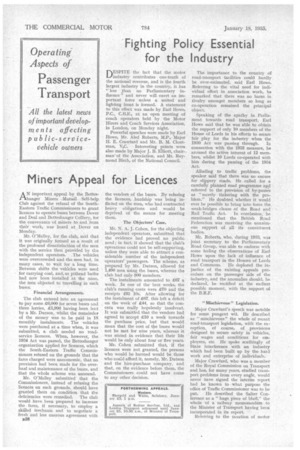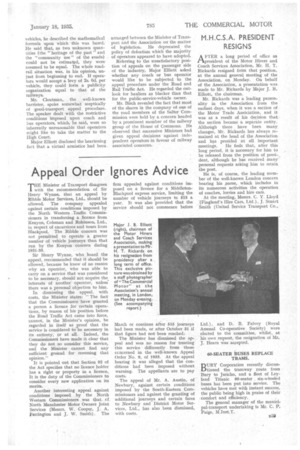Fighting Policy Essential for the Industry
Page 52

Page 53

If you've noticed an error in this article please click here to report it so we can fix it.
DESPITE the fact that the motor L./industry contributes one-tenth of the national revenue, and is the fourth largest industry in the country, it has "less pan no Parliamentary influence " and never will exert an important force unless a united and fighting front is formed. A statement to this effect was made by Earl Howe, P.C., C.B.E., at an open meeting of coach operators held by the Motor Hirers and Coach Services Association, in London, on Monday night.
Powerful speeches were made by Earl Howe, Mr. Aled Roberts, M.P., Major H. E. Crawfurd and Mr. B. M. Cloutman, V.C. Interesting points were also made by Major J. B. Elliott, chairman' of the Association, and Mr. Raymond Birch, of the National Council. The importance to the country of road-transport facilities could hardly be over-estimated, said Earl Howe. Referring to the vital need for individual effort in association work, he remarked that there was no harm in rivalry amongst members so long as co-operation remained the principal object.
Speaking of the apathy in Parliament towards road transport, Earl Howe said that he was able to obtain the support of only 10 members of the House of Lords in his efforts to secure fair play for the industry when the 1930 Act was passing through. In connection with the 1933 measure, he aroused the active interest of 12 members, whilst 10 Lords co-operated with him during the passing of the 1984 Act.
Alluding to traffic problems, the speaker said that there was no excuse for slippery roads. He called for a carefully planned road programme apd referred to the provision of by-passes as "merely tinkering with the problem." He doubted whether it would ever be possible to bring into force the weak-bridges clause of the Road and Rail Traffic Act. In conclusion, he mentioned that the British Road Federation was receiving the unanimous support of all its constituent bodies.
Mr. Roberts, who, during 1933, was joint secretary to the Parliamentary Road Group. was able to endorse with some feeling the observations of Earl Howe upon the lack of influence of road transport in the Houses of Lords and Commons. He deplored the injustice of the existing appeals procedure on the passenger side of the industry, and the anomalies should, he declared, be rectified at the earliest possible moment, with the support of the B.R.F.
" Mischievous " Legislation.
Major Crawfurd's speech was notable for some pungent wit. He described as " mischievous " the whole of recent road-transport legislation, with the exception, of course, of provisions designed to secure safety in vehicles, fair wages and conditions for employees, etc. He spoke scathingly of State interference with an industry which had been built up by the hard work and enterprise of individuals.
Major Crawfurd, who was a member of the Royal Commission on Transport and has, for many years, studied transport problems from every angle, would never have signed the interim report had he known to what purpose the office of Traffic Commissioner was to be put. He described the Salter Conference as a "huge piece of bluff," the whole of a railway memorandum to the Minister of Transport having been incorporated in its report.
Referring to the taxation of motor vehicles, he described the mathematical formula upon which this was based: He said that, as two unknown quantities (the "heritage of the past" and the "community use" of the -roads) could not be estimated, they were assumed to be equal. The whole roadrail situation was, in his opinion, unjust from beginning to end. If operators would accept a levy of 2s. 6d. per vehicle, they could form a publicity organization equal to that of the railways.
Mr. Cloutman, the well-known barrister, spoke somewhat sceptically of good-transport appeal procedure. The speaker dealt with the restrictive conditions imposed upon coach and bus operators, which, he said, were so inherently unreasonable that operators might like to take the matter to the High Court.
Major Elliott disclosed the heartening fact that a virtual armistice had been arranged between the Minister of Transport and the Association on the matter of legislation. He deprecated the policy of defeatism which the majority of operators appeared to have adopted.
Referring to the unsatisfactory position of appeals on the passenger side of the industry, Major Elliott asked whether any coach or bus operator would like to be subjected to the appeal procedure under the Road and Rail Traffic Act. He regarded the outlook for hauliers as blacker than that for the public-service-vehicle owner.
Mr. Birch revealed the fact that most of the shares in the company of one of the road members of the Salter Commission were held by a concern headed by a prominent member of the railway group of the House of Commons. He observed that successive Ministers had given appeal decisions •against independent operators in favour of railway associated concerns.




























































































